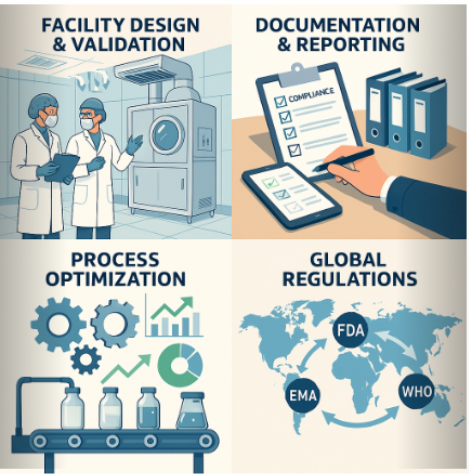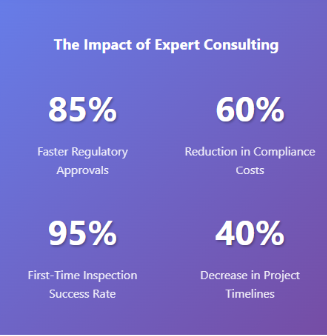Why Engineering Consultants Are Essential for Pharmaceutical Compliance

Overview
The pharmaceutical industry operates under some of the most stringent regulatory frameworks in the world. From FDA approvals to GMP compliance, pharmaceutical companies face an increasingly complex landscape of regulations that require specialized expertise to navigate successfully.
Engineering consultants have emerged as indispensable partners in this journey, bringing deep technical knowledge, regulatory expertise, and innovative solutions to help pharmaceutical companies achieve and maintain compliance while optimizing their operations and significantly reduce the risk of non-compliance. This ultimately safeguards the integrity and success of drug manufacturing operations. For organizations seeking to excel in compliance, engaging with engineering consultants is not just beneficial; it is essential for achieving operational excellence and compliance with current regulatory requirements
By leveraging their real-world expertise and proven successes, they can guide organizations through compliance complexities, ensuring not just adherence but also fostering a culture of continuous improvement. The path to operational excellence is paved with strategic insights and actionable solutions that engineering consultants provide, empowering companies to thrive in a dynamic regulatory landscape.
As the regulatory environment evolves, companies face mounting challenges in maintaining compliance to increased requirements. This raises a critical question: how can engineering consultants transform these hurdles into opportunities for operational excellence and sustained success?
How Engineering Consultants Deliver Solutions
- Regulatory Expertise with a deep understanding of FDA, EMA, and other regulatory requirements.
- Technical Design with specialized facility and equipment design for pharmaceutical manufacturing.
- Validation Services providing comprehensive validation protocols and testing procedures.
- Risk Management providing proactive identification and mitigation of compliance risks.
- Training & Support for staff training and ongoing support for compliance. Maintenance.
- Cost Optimization providing efficient solutions that meet compliance while controlling costs.
Key Compliance Challenges

Navigating pharmaceutical regulations presents significant challenges for companies, particularly in an environment characterized by rapidly evolving standards and stringent oversight. A primary difficulty lies in the constant flux of compliance requirements, which can vary markedly across regions and markets. To avoid non-compliance, companies must remain vigilant and informed about these changes. The complexity of the oversight landscape often complicates the interpretation of regulations, which are frequently articulated in technical language that can be difficult to grasp. Moreover, organizations may struggle to maintain comprehensive documentation and ensure that all processes are thoroughly validated.
These challenges are further exacerbated by the necessity for effective communication and collaboration among various stakeholders, including regulatory bodies, internal teams, and external partners. In this context, the role of engineering consultants becomes increasingly vital. The expertise of engineering consultants enables organizations to manage these complexities and implement robust regulatory strategies. For instance, firms that have engaged engineering experts have reported enhanced adherence results, illustrating the tangible benefits of leveraging specialized knowledge in overcoming legal obstacles. As the pharmaceutical industry continues to advance, the demand for such expertise will only escalate, underscoring the essential function of engineering consultants in ensuring compliance with standards.
Facility Design & Validation
Ensuring cleanroom environments, proper air flow systems, and equipment validation meet stringent regulatory requirements.
Documentation & Reporting
Maintaining comprehensive documentation systems and regulatory reporting that satisfy multiple global regulatory bodies.
Process Optimization
Balancing efficiency improvements with regulatory compliance while maintaining product quality and safety standards.
Global Regulations
Navigating varying regulatory requirements across different markets and jurisdictions worldwide.
Core Areas of Expertise
Engineering consultants specializing in pharmaceutical compliance bring expertise across multiple critical areas. Facility design and engineering encompasses everything from initial site planning to detailed engineering of manufacturing facilities that meet current Good Manufacturing Practice (cGMP) requirements.
Process validation is another crucial area where consultants provide invaluable support. They develop and execute validation protocols that demonstrate equipment and processes consistently produce products meeting predetermined specifications and quality attributes.
Key Benefits of Engineering Consultants

Engaging engineering experts for pharmaceutical adherence presents numerous advantages that significantly enhance an organization's ability to meet legal obligations. These advisors bring specialized expertise and extensive experience in GXP compliance services, including GMP audits, Data Integrity, and Standard Operating Procedures (SOPs). This expertise streamlines compliance processes, reducing the time and resources required to achieve adherence. Their proficiency in validation and quality assurance ensures that systems and processes are designed to comply with standards from the outset, thereby minimizing the risk of non-compliance.
Moreover, engineering advisors provide tailored solutions that cater to the unique needs of each organization, whether a startup or a large pharmaceutical entity. This customization is crucial in an industry where generic approaches often fail to address specific challenges. For instance, organizations implementing regulatory analytics solutions have reported an impressive 82% increase in reporting efficiency, illustrating how expert guidance can significantly enhance operational effectiveness.
Furthermore, these advisors facilitate comprehensive training initiatives for internal personnel, equipping them with the essential knowledge and skills to independently uphold regulations. This empowerment fosters a culture of adherence within the organization, which is vital for long-term success. Additionally, drug companies leveraging predictive analytics for risk management concerning regulations have indicated a 40% reduction in adherence violations and a 25% decrease in audit findings, further demonstrating the effectiveness of engineering specialists in improving outcomes.
Ultimately, the strategic engagement of engineering consultants assists organizations in navigating the complexities of pharmaceutical regulations and fosters a proactive adherence environment that can result in sustained operational excellence. With AVS Life Sciences' proven track record, including an 80% repeat business rate following the acquisition of ValidPath, clients can confidently rely on their ability to deliver comprehensive solutions in quality management and regulatory compliance.

By leveraging their technical knowledge and extensive industry experience, engineering advisors empower organizations to navigate the intricate regulatory landscape of the drug sector, addressing critical elements such as Data Integrity and Standard Operating Procedures (SOPs). This is especially significant in an industry where non-compliance can lead to severe consequences, including product recalls, legal penalties, and reputational harm.
For instance, implementing GMP standards not only enhances product quality but also mitigates the risk of costly regulatory failures, which can lead to lost revenue. As the drug manufacturing environment becomes increasingly complex, the role of engineering advisors in ensuring compliance with GMP and QSR standards is more essential than ever, underscoring their impact on the overall success and integrity of drug operations.
AVS Life Sciences offers comprehensive GXP oversight services, prioritizing quality adherence and validation solutions tailored for the pharmaceutical and biotechnology sectors.
The Future of Pharmaceutical Compliance
As the pharmaceutical industry continues to evolve, the role of engineering consultants becomes even more critical. Digital transformation is reshaping compliance requirements, with technologies like artificial intelligence, blockchain, and Internet of Things (IoT) creating new opportunities and challenges.
Personalized medicine and advanced manufacturing techniques such as continuous manufacturing are introducing new regulatory considerations that require specialized expertise to navigate successfully.
Engineering consultants who stay at the forefront of these developments provide pharmaceutical companies with the competitive advantage needed to succeed in an increasingly complex regulatory environment while maintaining the highest standards of product quality and patient safety.
Conclusion
The indispensable role of engineering consultants in the pharmaceutical industry is paramount. Their expertise serves as a critical bridge between intricate regulatory requirements and effective compliance strategies, ensuring organizations adhere to Good Manufacturing Practices (GMP), ISO standards, and Quality System Regulations (QSR). By delivering specialized knowledge and tailored solutions, these professionals enable companies to navigate the complex landscape of pharmaceutical regulations, mitigating risks and bolstering operational integrity.
This article has underscored the significant contributions of engineering consultants, particularly their involvement in validation, quality assurance, and regulatory submissions. Their capacity to streamline compliance processes, cultivate a culture of adherence, and enhance training initiatives exemplifies the tangible benefits they offer organizations. The challenges of navigating evolving regulations and maintaining comprehensive documentation further highlight the necessity of their expertise in ensuring compliance and avoiding costly repercussions.
As the pharmaceutical landscape continues to evolve, the demand for engineering consultants will only intensify. Engaging these specialists not only fortifies compliance efforts but also propels operational excellence and innovation within the industry. Organizations are urged to acknowledge the value of engineering consultants as essential partners in their journey toward maintaining regulatory adherence and achieving long-term success in the competitive pharmaceutical market.
Conclusion
Partner with experienced engineering consultants from AVS Life Sciences who understand the complexities of pharmaceutical compliance and can help you navigate regulatory challenges while optimizing your operations.
Frequently Asked Questions
What is the role of engineering consultants in pharmaceutical compliance?
Engineering consultants play a pivotal role in aligning compliance demands with effective execution in the pharmaceutical sector, ensuring adherence to Good Manufacturing Practices (GMP), ISO standards, and Quality System Regulations (QSR).
What activities do engineering advisors engage in?
Engineering advisors engage in various activities, including validation and commissioning, quality assurance consulting, and guidance on regulatory submissions.
How do engineering advisors help organizations in the pharmaceutical industry?
They leverage their technical knowledge and extensive industry experience to navigate the regulatory landscape, addressing critical elements such as Data Integrity and Standard Operating Procedures (SOPs).
What are the consequences of non-compliance in the pharmaceutical industry?
Non-compliance can lead to severe consequences, including product recalls, legal penalties, and reputational harm.
How does implementing GMP standards benefit drug manufacturing?
Implementing GMP standards enhances product quality and mitigates the risk of costly regulatory failures, which can result in lost revenue.
What services does AVS Life Sciences offer?
AVS Life Sciences offers comprehensive GXP oversight services, prioritizing quality adherence and validation solutions tailored for the pharmaceutical and biotechnology sectors.
